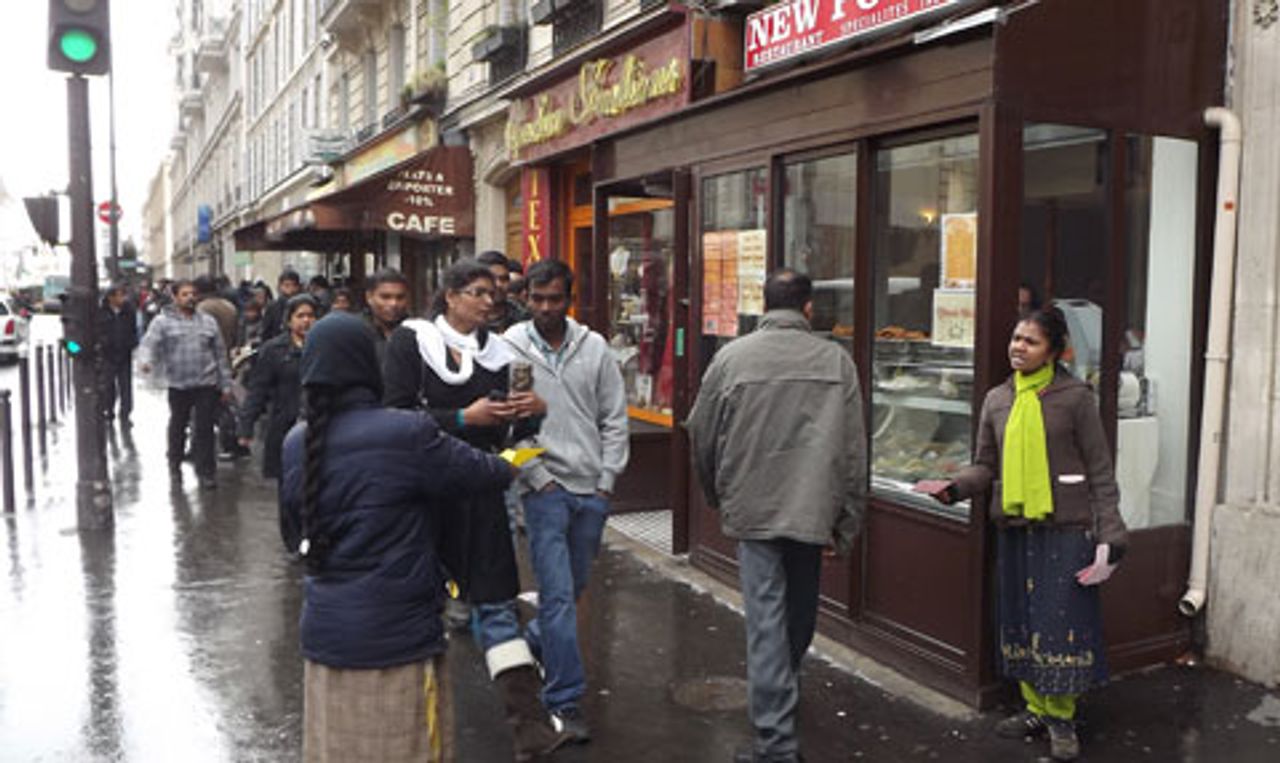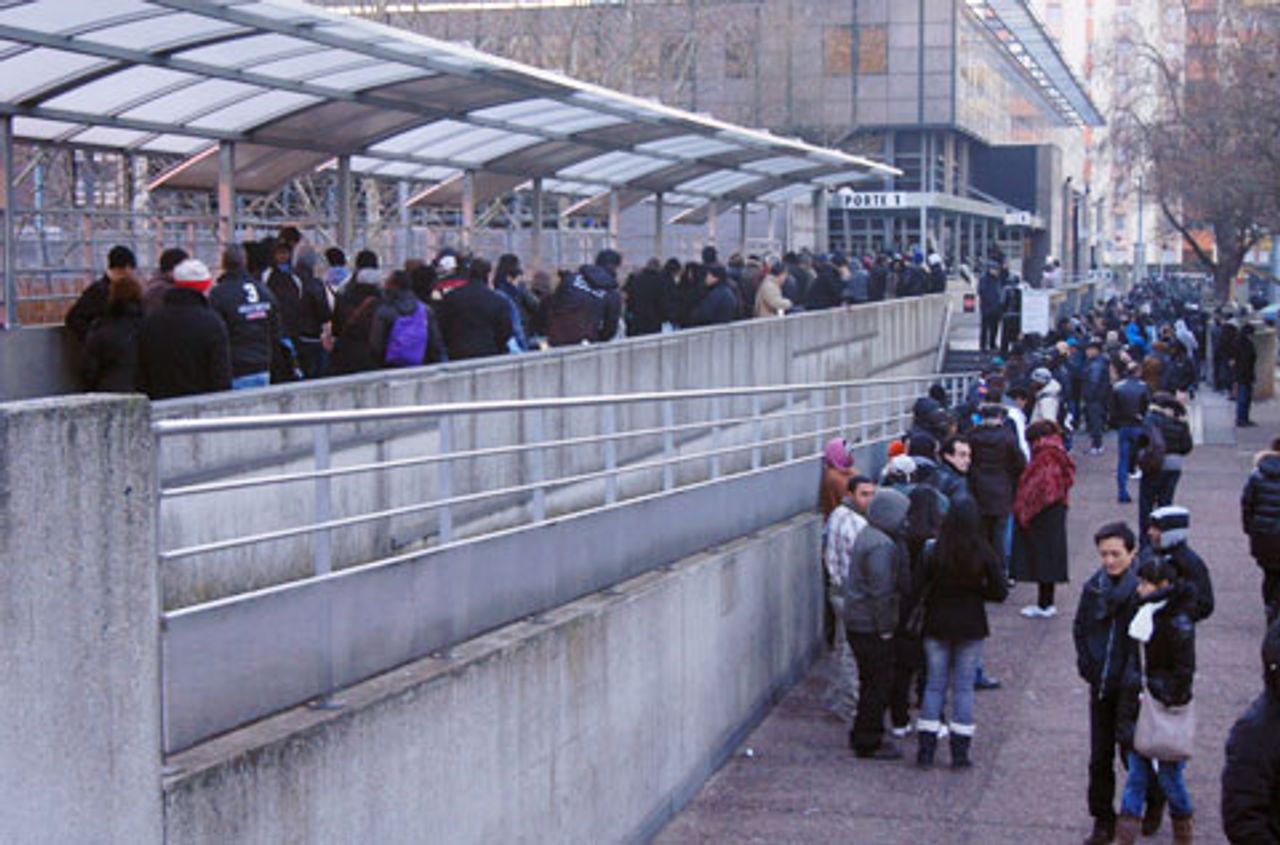Before the second round of the French presidential elections, anti-immigrant and anti-Islam campaigns are coming increasingly to the fore. Both candidates, President Nicolas Sarkozy and Socialist Party (PS) candidate François Hollande, are increasingly attacking immigrant workers, using them as scapegoats. Under these conditions, WSWS reporters interviewed Tamil immigrant workers and refugees in the Paris area.
 La Chapelle
La ChapelleMore than 100,000 Tamils live in France, most having come as political refugees after the civil war in Sri Lanka erupted in 1983. Most work in restaurants, cleaning, construction and odd jobs. Many work more than 11 hours per day in the restaurants.
An immigrant worker with four small children living in a small apartment in Drancy said, “I work in a restaurant from 5 p.m. until 2 a.m. I only get a basic salary, even if I work on Sunday. This salary is not enough to live. My wife is working part-time as a cleaning woman. She gets €350 per month. Today, everything is very expensive; it is very hard to live.”
Asked about the presidential election, he added, “Sarkozy’s and Hollande’s programmes are the same; they are representative of the banks and big business. They offer nothing for French or immigrant workers. They will attack us more and more with austerity.”
WSWS met many Tamil undocumented refugees. Most of them are youths affected by the Sri Lankan civil war. Most depend on support from family members or friends, or work illegally. Their situation is very critical; unable to get visas or work permits, they cannot work legally or get assistance from the government, and thus face enormous difficulties without jobs, income, or proper housing.
Many work long hours, 10 hours or more, sometimes earning as little as €25 or €30 per day. Sometimes their bosses cheat them of their salary, knowing very well that undocumented workers cannot bring legal action against them.
One refugee who works two days per week in a restaurant in northern Paris said, “I am from Kilinochchi, northern province in Sri Lanka. I came to France in 2005 as a political refugee. Ten days later, police arrested me and put me in the detention camp near the airport, then deported me to Colombo with three French police guards. They handed me over to the Sri Lankan security authorities. Then, the criminal investigation police brought me to their headquarters in Colombo, which is infamous for torture and murder. After the inquiry, they sent me to prison for six months under the ‘Prevention of Terrorism Act’ in Negombo jail.”
He added, “In final stage of war in April 2009, I was trapped in the war zone area. I lost my two brothers, and finally I managed to come to the Sri Lankan military control area with my mother. They arrested me again and put me through four different secret ‘rehabilitation’ camps. I was tortured many times. Paramilitary groups [Karuna groups and the EPDP] threatened to kill me. Finally, I attempted to commit suicide. Now, for a second time, in 2012, I came to France to save my life. I appealed to the OFPRA [the Office for the Protection of Refugees], but still I haven’t received any reply.”
Such comments refute the OFPRA’s cynical 2011 report on Sri Lanka, which claims, “In the space of two years, the situation of the North of Sri Lanka was radically transformed. Zones of armed conflicts and violence during almost thirty years, partially occupied by a separatist movement, are henceforth calmed.… Paramilitary groups no longer circulate openly with weapons, part of which were seized by the army. They were transformed into political parties, and participated peacefully in the local elections of March and July 2011”.
This report is false. In fact, the north and east of Sri Lanka remain occupied by the military, and killing, abduction and rape continue in these areas.
 Bobigny prefecture
Bobigny prefectureWSWS reporters also went to Bobigny prefecture. More than 400 immigrants were waiting in front of the building to get visas and other documents. Some women stood with their children. Most of them had been standing in line since midnight, or even 8 p.m. the day before.
At 8:30 a.m., authorities began to give out appointments, but they did not give them to everyone. Many refugees waited long hours for nothing. Agents shouted to the crowd, “There are no more tickets, if you want to stay you can, but it’s for nothing, so get out.”
One refugee said: “I have been waiting since 8 p.m. to get the visa, I haven’t any paper to show the police. If they arrest me, they will send me to prison”.
The WSWS spoke to Thas, a 33-year-old married Tamil refugee originally from Kayts, Sri Lanka. He is unemployed, with two children. He was wounded during the civil war, hit in the leg by gunfire from Tamil nationalist forces in Vavunia.
Thas has lived in France for 11 years, but he cannot find a job without proper papers. Currently, he lives with his family in a foyer, with the help of some friends and social service organisations in France.
Thas said: “OFPRA and the Committee of Recourse for Refugees have rejected my appeal. Now, without visa, I and my entire family confront great difficulties to live here. I was arrested by French police four times. Each time I was released with the help of a lawyer. The war is over in Sri Lanka, but our areas are still occupied by army and paramilitary forces. In this situation, who can give proper guarantees for our life? I can’t imagine returning to Sri Lanka. Few days before, when I wait in the line at midnight, some thugs attacked me. You can see my left eye is still now injured. If they give a visa, would we face such a situation?”
The WSWS also spoke to Vasi, a 24-year-old single refugee, who is unemployed and has lived four years in France.
He only has three-month temporary visas to stay in France. Every three months, he comes to the prefecture to try to renew his visa. In Sri Lanka, he imprisoned for three years and tortured by security forces. He was wounded in the back and his teeth.
When we talked with him, he said; “I am waiting here since 22:00 to get an appointment. I am trembling with cold. I have lost everything in my life. I can’t return back to Sri Lanka; I have enormous problems with police and the army. I was in prison for three years, and when they released me I was able to escape from the country. When I explain to authority of OFPRA, they said absurdly that it is not true.”
According to the report of Cimade, more than 35,500 foreigners were placed in detention centres in 2009 (32,268 in 2008), including 318 children. The number of foreigners deported from France is rising—32,922 in 2011, with a 2012 target set at 35,000.
